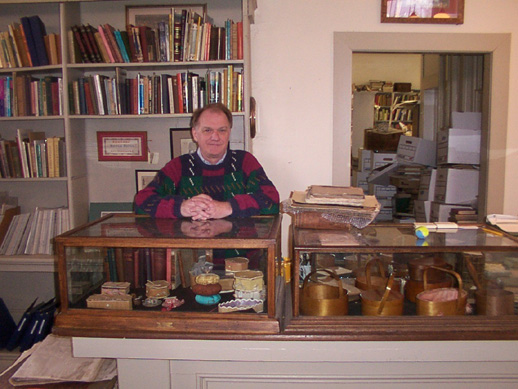Shakers, Maine, and Everything Else A Visit with DeWolfe and Wood
- by Michael Stillman

Frank Wood at the counter.
Much of the ephemera, such as labels, is a testament to the Shakers’ productivity and good business instincts. The variety of goods they produced is surprising. Among the Shaker labels offered in Catalog 45 are those for cans of vegetables, medicines, herbs, and tomato ketchup. There are labels for cherry water, rose water, and peach water (and you thought designer water was a new invention!). There are even labels for, of course, chairs. There’s an 1889 broadsheet for Shaker Hair Restorer. How about a Shaker butter wrapper, a container for Shaker Apple Sauce or Shaker Brick Oven Baked Beans, a bottle for Shaker Digestive Cordialor one proclaiming “The Shaker Family Pills are Excellent for Headache, Colds, Bilious Disorders and Constipation?” Despite an apparently bland lifestyle, they still managed to make Shaker Horse Radish.
One thing Scott DeWolfe noted about the Shakers is “they’ve always been good business people and changed to fit the times.” Alfred once had a saw mill and sold products from the farm. However, in the 20th century, they moved away from men’s activities as the number of men in the community dwindled. So, they turned to “fancy goods” that could be more easily fashioned by women and sold to tourists. Some schoolgirls in the community would produce these items before going to school. Today, the few remaining Shakers at Sabbath Day Lake still produce a few “fancy goods,” herbs, and biscuit mix. And while you may not find biscuit mix at DeWolfe and Wood, you will find around 1,000 different Shaker items currently in stock.
DeWolfe and Wood will go almost anywhere to buy a Shaker collection. DeWolfe has gone to California, Wood to Montana. Frank Wood in particular sees the day when he will spend most of his time traveling around the country, looking for collections. “We’re obsessed,” he comments. Unlike their other material, most Shaker items are sold through a catalog. They have a mailing of 500 collectors and institutions that buy Shaker material. They also sell excess items held by institutions such as Shaker museums. Their current catalog consists of duplicate items from the Western Reserve Historical Society in Cleveland.
It’s easy to forget that Shaker material is only a small part of the trade at DeWolfe and Wood. It may be the most important, and it is the field for which these booksellers are best known, but it’s not large enough to support their business by itself. This is especially true for a store which is not exactly located in an area noted for high population density. “The bottom line in Maine,” says Frank Wood, “is if you want to survive, you have to do everything.”